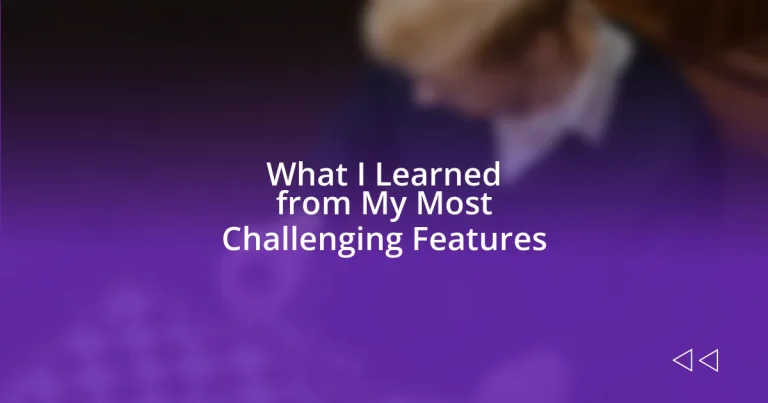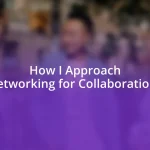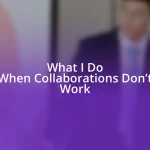Key takeaways:
- Understanding challenges fosters personal growth and helps develop resilience through introspection and reflection.
- Adaptability is crucial in navigating unexpected situations, allowing for innovative problem-solving and self-discovery.
- Learning from failures transforms setbacks into opportunities for improvement, highlighting the importance of collaboration and effective strategies in future projects.
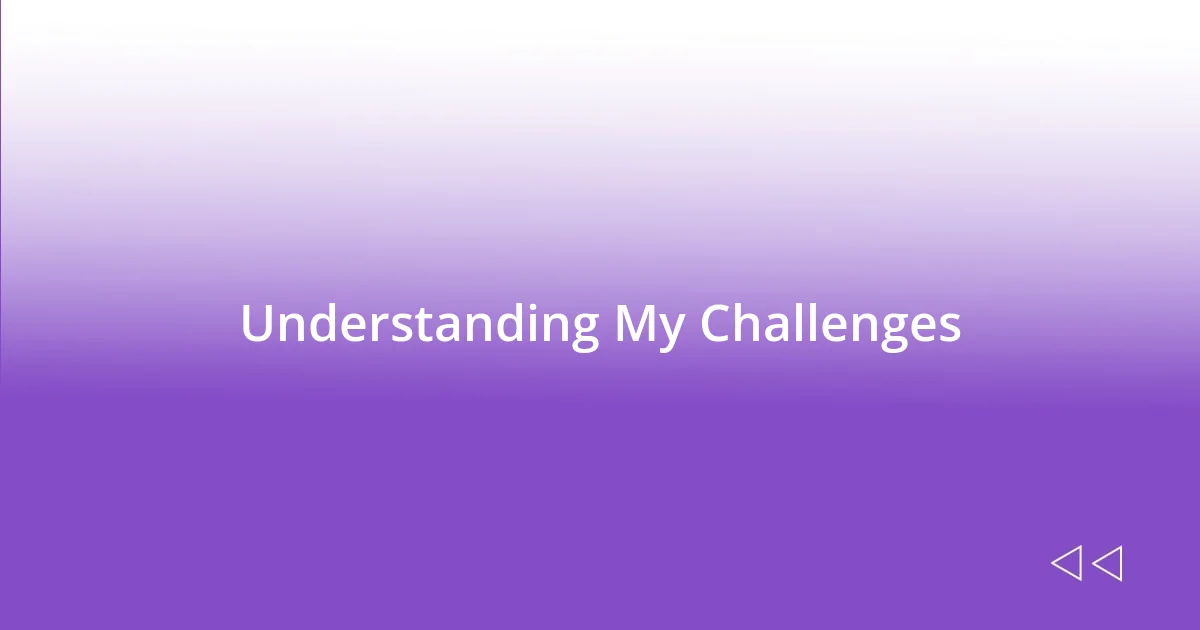
Understanding My Challenges
Understanding my challenges often feels like peeling back the layers of an onion. I remember a time when I faced self-doubt during a crucial project at work; every mistake felt magnified, and I wondered if I was cut out for the role. That experience continually reminds me that it’s normal to struggle, but understanding those moments can lead to profound growth.
Sometimes, I find myself reflecting on how my challenges have shaped my character. For instance, when I dealt with a difficult personal relationship, it forced me to confront my own weaknesses and biases. Have you ever been in a situation where a challenge pushed you to reevaluate your beliefs? In my case, embracing that discomfort taught me empathy in ways I never imagined were possible.
I’ve also come to realize that challenges can be powerful teachers. I once struggled with time management during a busy season, feeling overwhelmed by my commitments. It made me question how effectively I was prioritizing my responsibilities. This introspection not only helped me develop better strategies but also instilled a sense of resilience that continues to serve me today.
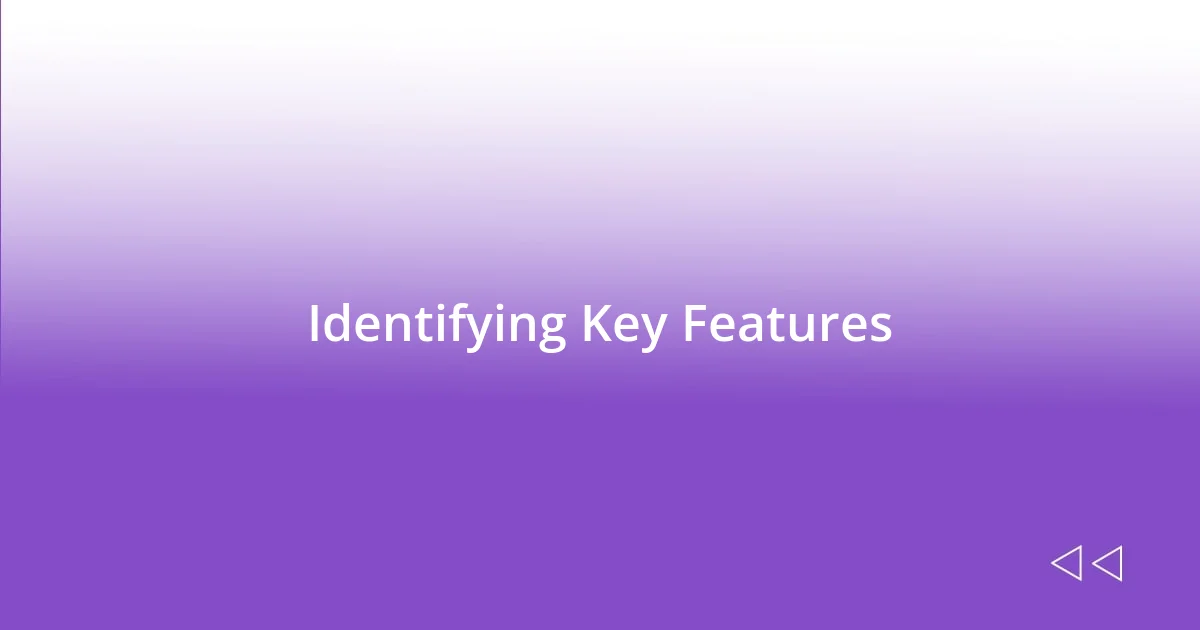
Identifying Key Features
Identifying key features of my challenges has often required a deep dive into my experiences. One significant moment stands out: I was tasked with leading a team through a project with tight deadlines, and I felt the weight of responsibility heavy on my shoulders. In this scenario, my tendencies to overthink and micromanage became glaringly obvious. Recognizing these patterns was crucial, as it allowed me to understand how they not only impacted my performance but also affected the team dynamic.
To pinpoint these key features effectively, I’ve found it helpful to break down my experiences into specific elements. Here’s a brief list of what I focus on:
- Behavioral Patterns: How do I typically react under pressure?
- Emotional Triggers: What situations spark feelings of doubt or fear?
- Response Strategies: What coping mechanisms do I employ when faced with challenges?
- Impact on Others: How do my challenges affect those around me?
- Learning Opportunities: What lessons can I extract from each situation?
By examining these aspects, I better understand not just my challenges but also the potential for growth they offer.
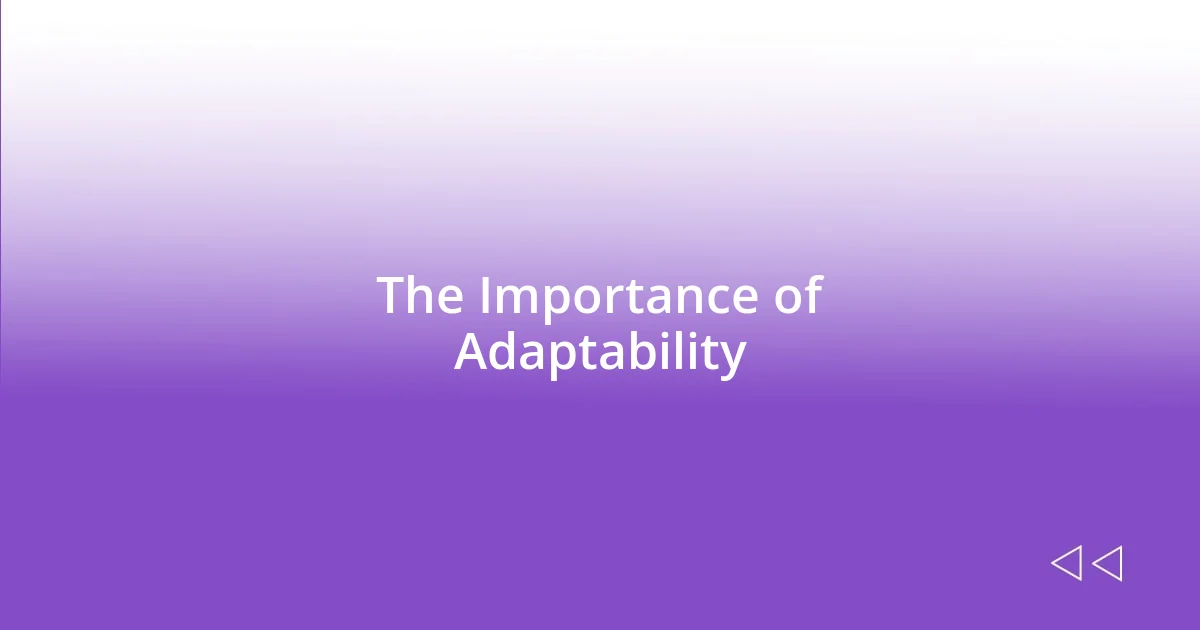
The Importance of Adaptability
Adapting to change has been one of the most vital lessons in my journey. I recall a job transition that tested my ability to embrace new methodologies. Initially, the uncertainty felt overwhelming, and I found myself clinging to familiar practices. Yet, with time, I realized that fluidity in my approach opened doors I didn’t know existed, enabling me to thrive in an unfamiliar environment.
In moments when life threw unexpected challenges my way, adapting often felt like a matter of survival. I vividly remember the sudden shift to remote work during a pandemic. The initial struggle with technology felt daunting. However, as I adapted my work habits to a virtual setting, I discovered innovative ways to collaborate with my colleagues. This experience highlighted that adaptability is not merely a skill; it’s a mindset that encourages growth and creativity when faced with adversity.
Perhaps the most enlightening aspect of adaptability is how it leads to discovering more about oneself. I had a personal situation where I had to juggle family responsibilities along with professional commitments. I had to pivot my routine frequently, and through that process, I learned the art of flexibility. Each adjustment taught me more about my own resilience, revealing strengths I didn’t realize I had.
| Example of Adaptability | Outcome |
|---|---|
| Job Transition | Expansion of skills and comfort in new environments |
| Shift to Remote Work | Improved collaboration and innovative solutions |
| Juggling Family and Work | Discovery of personal strengths and resilience |
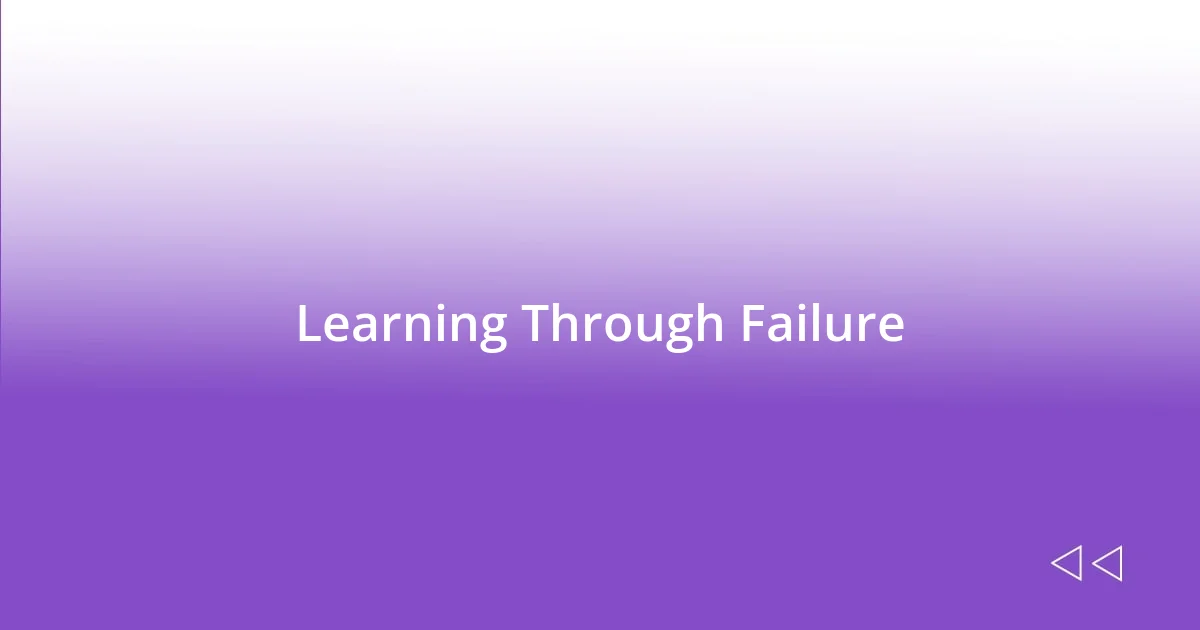
Learning Through Failure
Each failure I’ve encountered has revealed a customized roadmap for growth. I remember a presentation that did not go as planned; my nerves got the best of me. In that moment, I wondered if my fear of public speaking would ever fade. Rather than sulking in defeat, I forced myself to analyze what went wrong. Was it my preparation? My mindset? This reflection led me to join a public speaking group, which transformed my fear into a burgeoning skill.
It’s fascinating how setbacks can be the spark igniting self-improvement. I had a project that flopped because I ignored my team’s input, relying instead on my instincts. That taught me the value of collaboration. Why did I resist input from others? I realized it stemmed from insecurity about my leadership. Acknowledging this helped me shift my approach, enhancing team cohesion and driving better results in future projects.
Recognizing failure as a teacher can feel empowering, even in the moment of discomfort. There was a time when a critical deadline passed, and I found myself overwhelmed and scrambling. I had to confront what this pressure did to my decision-making. Was I really giving my best, or was I just rushing through tasks? Diving into my habits helped me understand that effective time management was essential for my mental clarity. Now, I view each stumble not just as a hurdle but as a crucial lesson on my journey of self-discovery.
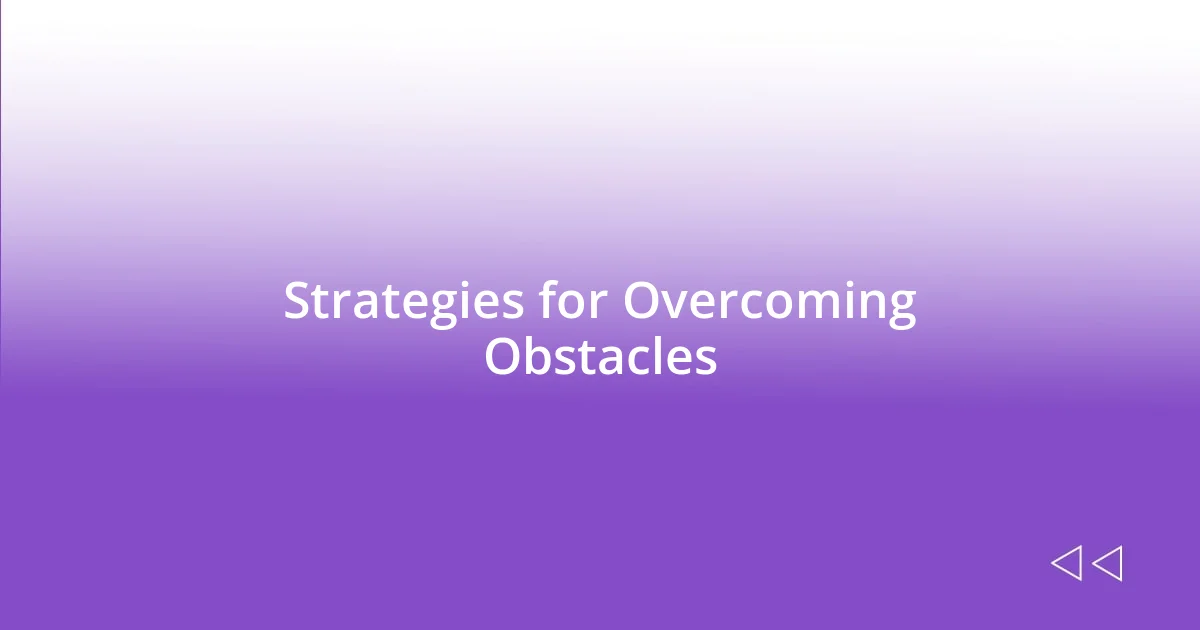
Strategies for Overcoming Obstacles
Developing a resilient mindset has been indispensable in overcoming obstacles. I remember facing a huge setback when a major project fell through at the last moment. At first, the disappointment felt crushing. Yet, I decided to treat it as an opportunity to really assess what specifically went wrong. Was it an issue with communication? Did I overlook crucial details? Digging deep into those questions not only helped me identify the gaps but also reinforced my determination to approach future projects with renewed focus and diligence.
I’ve found that establishing a network of support can dramatically ease the burden of obstacles. During my most challenging times, reaching out to friends and mentors not only provided different perspectives but also emotional reinforcement. I recall a particularly tough phase when I felt stuck in my career. Sharing my frustrations with a mentor led to invaluable advice that shifted my outlook entirely. What’s more, knowing that I wasn’t alone in my struggles created a sense of camaraderie that motivated me to keep pushing forward.
Engaging in practical self-care strategies has also played a pivotal role for me. When stress levels rise, I’ve learned to take deliberate breaks and allow myself space to recharge. For instance, I started incorporating short walks into my daily routine. Those brief moments away from my desk offered not just a physical reset but also mental clarity. It led me to realize that sometimes stepping back is exactly what you need to come back stronger and more focused. How have those little pauses helped you reflect and recharge? For me, they reestablished my energy and creativity, turning obstacles into opportunities for growth.
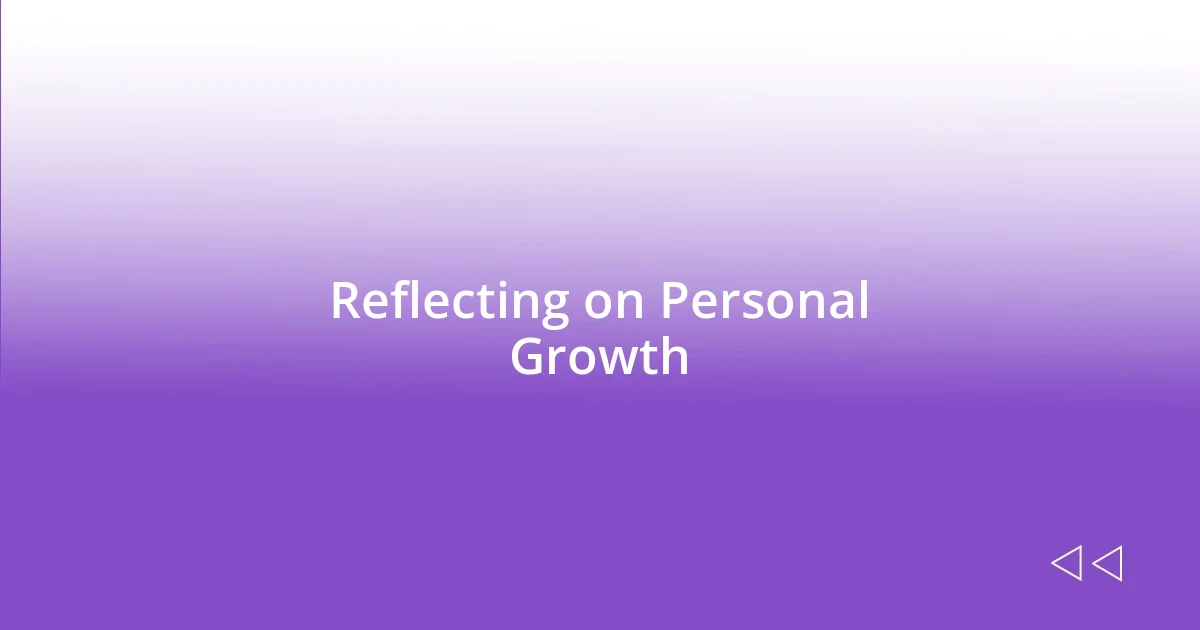
Reflecting on Personal Growth
Reflecting on personal growth often brings me to moments that tested my resilience. There was a time when I almost gave up on a long-standing goal of mine—learning a new language. Frustration mounted as I stumbled over pronunciation and grammar, making me question my intelligence. Yet, after dedicating time to reflect on what was truly holding me back, I realized that I was too focused on perfection. By shifting my mindset and embracing small victories, I reignited my passion for learning and redefined my approach to challenges.
In my experience, growth doesn’t just come from the big victories; it’s often nestled in the quiet realizations. I once faced a conflict with a colleague that left me feeling drained. Instead of pointing fingers or shutting down, I took a step back and pondered my own role in the situation. Could my communication style have been clearer? This introspection not only mended our working relationship but also taught me the importance of empathy and open dialogue—a lesson that continually shapes my interactions.
One of the most profound insights I’ve gained is that personal growth often feels uncomfortable. I recall a time when I hesitated to take on a challenging leadership role. The fear of not being “good enough” loomed large. But when I finally said yes, the thrill of pushing through that discomfort opened new doors for me. How often do we let fear dictate our choices? For me, embracing those uncomfortable moments has become essential in my journey, transforming challenges into stepping stones for growth.
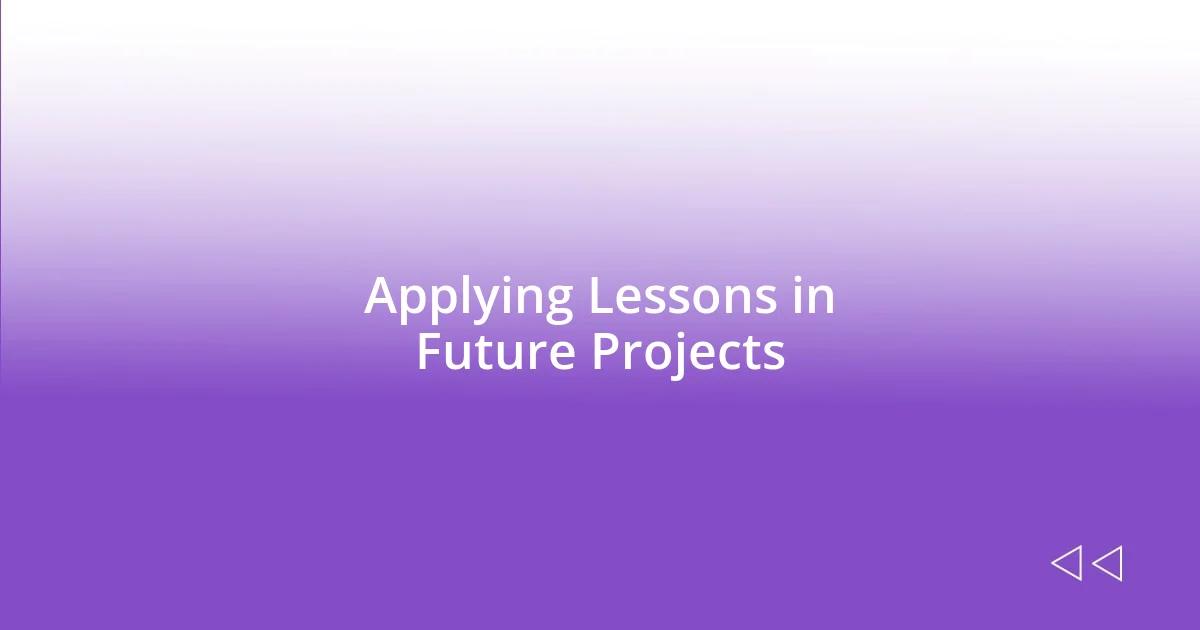
Applying Lessons in Future Projects
Applying the lessons I’ve learned from past challenges has fundamentally changed how I approach new projects. For example, I once struggled to meet a tight deadline because I didn’t break the task down into manageable parts. Now, I always start by creating a detailed timeline and setting smaller milestones. It’s a simple change, but it’s made all the difference in preventing overwhelm and keeping everything on track. Have you ever felt paralyzed by a big task? I’ve been there, and this method has alleviated a lot of that stress for me.
Collaboration has also become a central focus in my future endeavors. After working through a particularly isolating project, I realized the value of tapping into diverse perspectives. So, I committed to involving team members earlier in the brainstorming phase. This not only fosters a sense of ownership among everyone involved but also leads to unexpected ideas that can propel the project forward. I can’t help but wonder: how often do we underestimate the power of collaboration? By opening up the floor to contributions, I consistently find solutions that I might never have considered on my own.
Additionally, staying adaptable has been a game-changer for me. I recall a situation where I had to pivot mid-project due to unforeseen circumstances. Instead of panicking, I embraced that flexibility and seized the opportunity to innovate. Now, I approach future projects with the understanding that change is part of the process—it’s not a roadblock, but a chance for creativity. How do you react when plans shift unexpectedly? Over time, I’ve learned that these moments often lead to the most rewarding outcomes when approached with an open mind.












